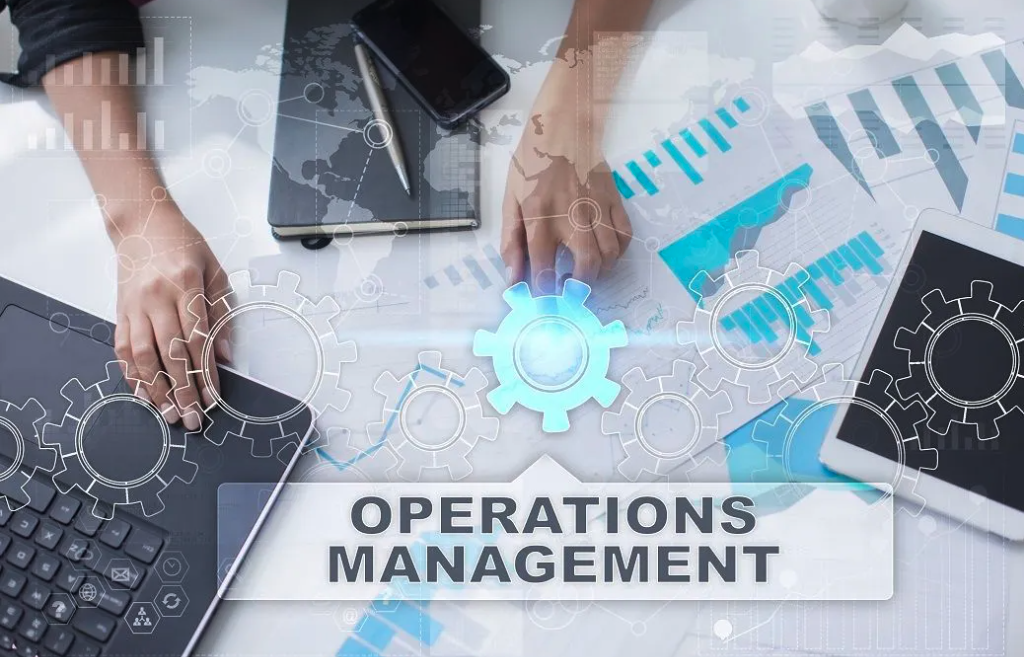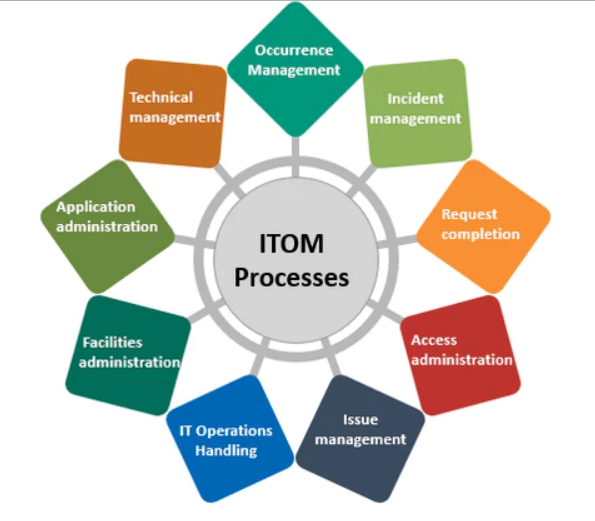
IT Operations Management (ITOM) (Image by Corporate Finance Institute)

IT Operations Management (ITOM) (Image by Corporate Finance Institute)
What is operations management and why is it important? An operations manager is responsible for coordinating the various components of an IT system.
Why is it necessary, you ask? Well, it’s about ensuring every task and resource is used to its full potential.
In IT, operations management is the difference between success and chaos. It fine-tunes every aspect, from software development to network maintenance, ensuring each element works harmoniously.
You might ask, why is all this fuss over some fancy management stuff? Here’s the thing: a smooth-running IT operation means happy customers, faster fixes, and a business that sings.
Operations management tackles the invisible gremlins – the downtime demons, the resource bottlenecks, the security gremlins.
How and why does the operations management team do all of these things? Here’s a look at what they do and why.
IT operations management systematically orchestrates people, processes, and technology to deliver and support IT services efficiently and reliably. Operations management is critical for the efficient and secure functioning of an organisation’s IT infrastructure.
The role of ITOM is evolving with technological advancements, mainly through data and digital transformation, leading to significant improvements in operations and providing a competitive edge in today’s rapidly changing technological environment.
However, it’s crucial to recognize that mismanagement in this IT operational management area can impede corporate progress and jeopardise the security and accessibility of services for customers.
IT operations management peeps analyse workflows, identify bottlenecks, and streamline procedures. Think of them as efficiency ninjas, slashing wasted time and boosting productivity.
IT operations management is the first line of defence. They constantly monitor performance, diagnose issues, and fix problems before they snowball into chaos.
So, next time you enjoy a seamless online experience, remember the silent heroes behind the scenes – the IT operations management crew.
Operations management is a multifaceted field that forms the cornerstone of any successful business, especially in IT.
That’s why operations management involves several key components, each with its unique function and benefit. Understanding these components is crucial to grasp the full scope of operations management.
Planning involves setting objectives, identifying resources, and outlining the steps necessary to reach those goals.
In operations management, planning is essential for foreseeing potential challenges and opportunities, allowing for proactive measures rather than reactive responses.
The benefit of effective planning is the creation of a roadmap that guides the entire operational process. Planning ensures the resources are allocated efficiently and tasks are prioritised appropriately, contributing to the overall success and sustainability of the organisation.
This strategic approach helps reduce uncertainty, optimise resource use, and improve decision-making, making it a cornerstone of effective operations management.
Organising operations management is the process of structuring and allocating resources, including personnel, finances, and technology, to achieve the objectives set during the planning stage.
Organising is about creating a framework defining roles, responsibilities, and processes. Those elements are critical because they establish a clear operational structure that facilitates coordination and collaboration within the organisation.
Organising has the benefit of creating a harmonious work environment where every resource is utilised effectively, and every team member knows their role.
Organising enhances productivity by streamlining workflows and reducing operational inefficiencies. Organising ensures the right people are in the right roles, working together cohesively towards a common goal.
Directing is the act of guiding, leading, and overseeing the execution of plans. Directing is a fundamental role because it deals with the human aspect of operations.
Directing involves communicating goals, motivating staff, and resolving any issues during the operational process.
The primary benefit of effective directing is that it ensures the workforce is engaged and aligned with the organisation’s objectives.
It fosters a positive work environment, encourages teamwork, and boosts morale. Good leadership and clear communication in directing help maintain focus and commitment to the operational goals, ensuring tasks are performed efficiently and effectively.
Controlling in operations management refers to monitoring and evaluating the progress of operational activities to ensure they align with the set plans and objectives.
This includes tracking performance, identifying deviations from the plan, and implementing corrective actions.
The significance of controlling lies in its capacity to maintain quality and efficiency in operations. The benefit of this component is its role in ensuring continuous improvement.
By regularly assessing performance and making necessary adjustments, controlling helps minimise errors, reduce costs, and enhance product or service quality.
It provides a feedback loop essential for learning and growth, enabling the organisation to adapt and thrive in a dynamic business environment.
As mentioned earlier, operations management aims to optimise every process for maximum efficiency and effectiveness. It is a diverse field that significantly impacts various aspects of a business.
Let’s take a closer look at some of the key functions of operations management. Each function significantly affects a business’s overall success and sustainability.
In the realm of production and manufacturing, operations management is the heartbeat. Operations management oversees the production process to ensure efficient and high-quality product manufacturing.
Operations management in manufacturing focuses on optimising production processes, reducing waste, and enhancing productivity.
It involves meticulous planning and control of the manufacturing process, from raw material handling to the final product.
The goal here is twofold: improving efficiency to reduce costs and ensuring the highest quality of the end product. This dual focus streamlines production and bolsters the business’s reputation for quality.
Operations management is an integral part of supply chain management because it encompasses the strategic oversight of the entire supply chain process, from the procurement of materials to the delivery of the final product.
The aim is to create a seamless, efficient supply chain that minimises costs while maximising productivity and meeting customer demands.
Strategies in this area include optimising inventory levels, enhancing supplier relationships, and employing just-in-time manufacturing.
By refining these processes, ITOMment ensures a smooth flow of goods, reduces delays, and avoids unnecessary expenses, strengthening the organisation’s supply chain.
ITOM is essential in the service sector to ensure quality service delivery and customer satisfaction.
It involves managing and improving the efficiency of all processes that contribute to the delivery of services.
This includes managing staff, optimising service procedures, and ensuring customer needs are met promptly and effectively.
Operations management in services focuses on enhancing the customer experience, reducing service delivery times, and improving the quality of the service.
Prioritising these aspects ensures the service meets and exceeds customer expectations, essential to building customer loyalty and maintaining a competitive edge in the marketplace.
At its core, operations management is about efficiency and effectiveness – it’s what helps a business transform its inputs into outputs optimally.
Now, why is this important? Think about a business as a whole. ITOM touches every part of it, from production lines to customer service desks.
By optimizing these processes, a business can reduce costs and improve quality, directly impacting its bottom line.
Profitability isn’t just about increasing sales; it’s also about how efficiently you can run your operations.
But it’s not all about money. There’s a human element too. Operations management plays a crucial role in customer satisfaction.
If your processes are slick and your service is top-notch, customers are more likely to be happy and keep coming back. Happy customers mean repeat business and good word-of-mouth, gold for any company.
So yes, good operations management is vital to a business’s success. It keeps costs down, profits up, and customers happy. It’s a balance of the practical and the personal, and getting it right can make all the difference.

Challenges in Operations Management
The IT landscape is a high-speed roller coaster, and 2024 promises some thrilling twists and turns for operations management. Here’s what’s peeking over the horizon.
As we look into 2024, IT Operations Management is poised for significant evolution, driven by various emerging trends. A central theme across these trends is the increasing integration and impact of artificial intelligence (AI) and machine learning.
One of the primary trends to watch is the rise of machine customers. This refers to non-human economic actors, such as AI personal assistants, smart appliances, and connected cars, conducting economic transactions.
By 2030, it is expected that half of the population in advanced economies will use AI personal assistants daily, and these machine customers could contribute up to 20% of business revenue. Therefore, IT operations must adapt to these new types of customers and their unique requirements.
Another significant trend is the focus on AI Trust, Risk, and Security Management (AI TRiSM). As AI becomes more integrated into IT operations, managing the risks and ensuring the security and reliability of AI systems is critical.
Another consideration is the tech world is like a disco ball of change – spinning faster than you can say new update. Keeping up with the latest tools, security threats, and platform quirks can leave your head spinning, making it challenging to optimise processes and stay ahead of the curve.
Then, A significant challenge is finding and retaining skilled IT professionals. The talent paradox is akin to balancing on a tightrope without a safety net.
Skilled IT professionals are in high demand, and attracting them requires more than just offering perks like a foosball table.
Competitive salaries, growth opportunities, and flexible work options are necessary to avoid the risk of experiencing the dreaded ‘Great Resignation’ echoing through your server room.
Lastly, a trend toward nationalism versus globalism is emerging, focusing on developing and retaining technologies, resources, and talent within national borders. This shift may lead to reevaluating global IT strategies and resource allocation.
Operations management is more like the strategic game master in business and IT. It’s a field about making things run smoothly and efficiently.
But why is it so important, especially as we look at 2024? Well, let’s put it this way: imagine your business as a complex puzzle. Each piece represents a different part of your operations – your people, processes, and technology.
ITOM is the skill of putting these pieces together in the most efficient way possible. Operations management is about planning, organising, directing, and controlling all these elements to achieve your business goals.
Now, consider the challenges we’re facing in 2024. We’ve got automation changing how we work, cybersecurity threats rising, and complex IT systems needing management.
Those things are big challenges, but this is where operations management really shines. By embracing automation, ITOM can boost productivity while keeping costs down.
With a strong focus on cybersecurity, operations management ensures the business stays safe and secure.
And by tackling the complexities of IT management, operations management keeps everything running smoothly, even as technology keeps evolving.
In essence, ITOM isn’t just a part of the business; the heartbeat keeps the whole operation alive and kicking.
So, what is operations management and why is it important? The answer is if you’re looking to stay ahead of the game in these fast-changing times, paying attention to operations management isn’t just good practice – it’s essential.